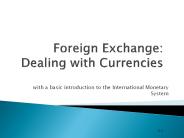The Foreign Exchange Market - PowerPoint PPT Presentation
1 / 19
Title:
The Foreign Exchange Market
Description:
Currency Conversion - Tourists ... Currency Conversion - Business ... To pay a foreign company for its products or services in its country's currency ... – PowerPoint PPT presentation
Number of Views:2515
Avg rating:3.0/5.0
Title: The Foreign Exchange Market
1
The Foreign Exchange Market
- Dr Carol Reade
- Bus 187
2
Learning Objectives
- Understand how the foreign exchange market works
- Examine the forces that determine exchange rates
- Discuss the implications for international
business of exchange rate movements
3
Introduction
- A firms sales, profits, and strategy are
affected by events in the foreign exchange market - It is important for managers to understand the
working of the foreign exchange market and how
changes in exchange rates can affect their
business
4
Definitions
- Foreign exchange market a market for converting
the currency of one country into the currency of
another. - Exchange rate the rate at which one currency is
converted into another - Foreign exchange risk adverse consequences of
unpredictable changes in exchange rates
5
Functions of the Foreign Exchange Market
- The foreign exchange market serves two main
functions - Convert the currency of one country into the
currency of another - Provide some insurance against foreign exchange
risk
6
Currency Conversion - Tourists
- Tourists (and consumers) can compare the relative
prices of goods and services in different
countries using exchange rates - Tourists are minor participants in the foreign
exchange market
7
Currency Conversion - Business
- International companies have four main uses for
foreign exchange markets - To exchange currency received in the course of
doing business abroad back into the currency of
its home country - To pay a foreign company for its products or
services in its countrys currency - To invest excess cash for short terms in foreign
markets - To profit from the short-term movement of funds
from one currency to another in the hopes of
profiting from shifts in exchange rates, also
called currency speculation
8
Insuring Against Foreign Exchange Risk
- The foreign exchange market can be used to
provide insurance to protect against foreign
exchange risk (the possibility that unpredicted
changes in future exchange rates will have
adverse consequences for the firm) - A firm that insures itself against foreign
exchange risk is hedging
9
Insuring Against Foreign Exchange Risk
- Spot Exchange Rates
- Forward Exchange Rates
- Currency Swaps
10
Spot Exchange Rates
- The spot exchange rate is the rate at which a
foreign exchange dealer converts one currency
into another currency on a particular day - A spot exchange occurs when two parties agree to
exchange currency and execute the deal
immediately - Spot rates change continually depending on the
supply and demand for that currency and other
currencies
11
(No Transcript)
12
Forward Exchange Rates
- Forward exchanges occur when two parties agree to
exchange currency and execute the deal at some
specific date in the future - Exchange rates governing such future transactions
are referred to as forward exchange rates - For most major currencies, forward exchange rates
are quoted for 30 days, 90 days, and 180 days
into the future - When a firm enters into a forward exchange
contract, it is taking out insurance against the
possibility that future exchange rate movements
will make a transaction unprofitable by the time
that transaction has been executed
13
Currency Swaps
- Currency swap the simultaneous purchase and sale
of a given amount of foreign exchange for two
different value dates - Swaps are transacted between international
businesses and their banks, between banks, and
between governments when it is desirable to move
out of one currency into another for a limited
period without incurring foreign exchange risk
14
The Nature of the Foreign Exchange Market
- The foreign exchange market is a global network
of banks, brokers, and foreign exchange dealers
connected by electronic communications systemsit
is not located in any one place - The most important trading centers are London,
New York, Tokyo, and Singapore - The markets is always open somewhere in the
worldit never sleeps
15
The Nature of the Foreign Exchange Market
- High-speed computer linkages between trading
centers around the globe have created a single
marketno significant difference between exchange
rates quotes - If exchange rates quoted in different markets
were not essentially the same, there would be an
opportunity for arbitrage (the process of buying
a currency low and selling it high), and the gap
would close - Most transactions involve dollars on one sideit
is a vehicle currency along with the euro, the
Japanese yen, and the British pound
16
Exchange Rate Determination
- Exchange rates are determined by the demand and
supply of one currency relative to the demand and
supply of another - Factors underlying currency supply and demand
- A countrys price inflation
- A countrys interest rate
- Market psychology
17
Exchange Rate Determination
- Relative monetary growth, relative inflation
rates, and nominal interest rate differentials
are all moderately good predictors of long-run
changes in exchange rates - So, international businesses should pay attention
to countries differing monetary growth,
inflation, and interest rates
18
Implications For Managers
- Firms need to understand the influence of
exchange rates on the profitability of trade and
investment deals - There are three types of foreign exchange risk
- 1. Transaction exposure
- 2. Translation exposure
- 3. Economic exposure
19
Managing Foreign Exchange Risk
- In general, firms should
- have central control of exposure to ensure that
subunits adopt correct mix of tactics
strategies - distinguish between transaction/translation
exposure, and economic exposure - attempt to forecast future exchange rates
- establish good reporting systems so the central
finance function can regularly monitor the firms
exposure position































